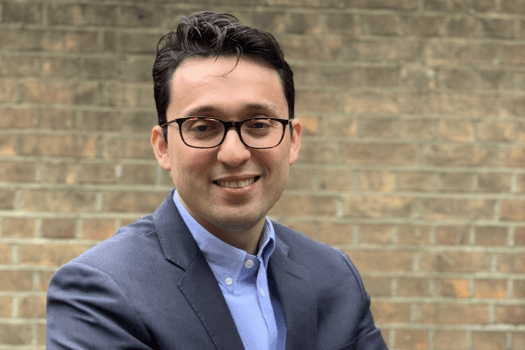“I started seeing that people interacted with the health care system much differently than I was used to seeing,” he said. “That’s when I learned there are two different health care systems: one for people of means, who have good insurance and who can see doctors when they need to; and a second health care system for people of low-income populations, which is often emergency rooms, and late and delayed care.
“I became very interested in health care, in discovering how to improve care for people that don’t necessarily have access to it.”
It is the issue that has driven Dr. Jose Figueroa ever since. In addition to being an instructor at Harvard Medical School and associate physician at Brigham and Women’s Hospital, his primary work is to study the impacts of state and federal health care policies, particularly on vulnerable populations, as assistant professor of health policy and management at the Harvard Chan School of Public Health.
And a formative piece of his journey was as the first recipient, in 2013, of the Rappaport Award in Clinical Innovation at Brigham and Women’s – a prize specifically designed to inspire new ways of thinking about value in health care.
“My first real experience with this work was through the Rappaport Foundation, and now I’m looking at it every day,” he said. “That project served as the foundation for a lot of the work I do now.”
The project was entitled, “Educating and Incentivizing Housestaff on Early Discharges: An Intervention at Cost Containment.” For an award that was specifically designed by the Rappaport Foundation to utilize the unique perspective of residents at Brigham and Women’s to shine a light on areas in need of value-improvement, and attempt to find a remedy, it was an ideal first recipient.
What Dr. Figueroa and his colleague, Dr. Bram Geller, were noticing was that for all the attention necessarily paid to the medical interventions needed to make sick patients better, there wasn’t enough time dedicated to the logistics of discharge.
“There’s all this stuff that hasn’t been done, because in some ways you haven’t thought about it yet as a team in the hospital,” Dr. Figueroa said. “Then there’s this huge delay in patients going home.”
Not only do the delays bring the obvious frustrations of patients and family members, the doctors reasoned, but a bed being used unnecessarily causes a downstream roadblock in the emergency rooms, creating both anxiety and potential safety concerns for those who need care sooner than later.
And then there’s the financial component. Add up a couple wasted hours here and a couple more there over the course of weeks, months and years, and the cumulative inefficiencies can create legitimate budgetary deficits.
So, how to combat such delays? In this case, the remedy for a complex problem boiled down to a very ordinary solution: Amazon gift cards.
It’s true. For their winning Rappaport project, Drs. Figueroa and Geller theorized that offering $50 bonuses to residents whose patients were released on time would mean greater discharge efficiency.
And … “We got the answer,” Dr. Figueroa said. “It worked.”




